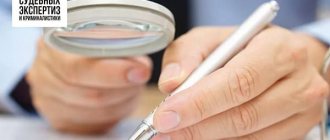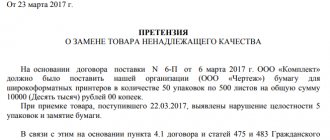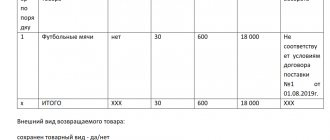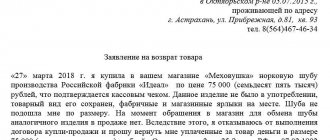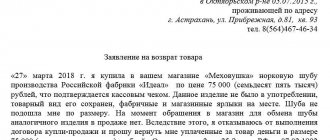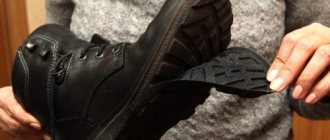When receiving a product from the purchaser for the purpose of exchanging for a suitable one, repairing or refunding money, the manufacturer or seller (depending on who the claim is made) is able to check the received item for compliance with quality. The consumer may be present during this inspection. And the result may be as follows:
- the deficiency was confirmed;
- the product is of high quality, but the claim is unfounded;
- There is a shortage, but it is not known who is to blame for this.
In the first case, the seller/manufacturer admits that the buyer is right and satisfies his request. Other cases are controversial and the parties to the conflict establish the truth by conducting an independent quality examination (commodity examination).
It is carried out by an independent, certified specialist. He evaluates the product for compliance with standards, confirms (refutes) the presence of deficiencies, and establishes the reasons for their occurrence. All this is documented in a written report, in which the expert puts his signature and seal.
The trader legally takes upon himself all the hassle of carrying out the examination. This is not always done in life. In this case, the calculation is made that the consumer, due to ignorance or unwillingness, will not waste his energy and will retreat.
But the consumer has the opportunity to appoint an examination himself and defend his interest.
Product examination: what is it and when is it carried out?
The examination of goods of inadequate quality means a comprehensive analysis of the product in order to determine the brand, grade, model, degree of wear, defects, and compliance of parameters with approved standards.
Most often, commodity examination is ordered to resolve a conflict between a seller and a buyer . There are often situations when a person demands that a store return money for a low-quality product sold, and the seller claims that the user himself is to blame for the damage. The check makes it clear who is involved in the defect.
During the study, the reasons for the decrease in the grade of goods during storage, transportation or sales, and commodity losses are identified. The compliance of the established product price with the actual quality is also determined.
Typically, commodity research is organized by the seller. But the buyer can also contact an expert on his own. If the inspection shows that the buyer is to blame for the defect, then he will be obliged to reimburse the store for the cost of the examination. If it is determined that the malfunction was caused by the seller, then the store will have to pay the full cost of the procedure, exchange the consumer a high-quality product, or return the money.
The research consists of the following stages:
- General inspection (the object is assessed for the presence of impacts, chips and other mechanical damage)
- Internal inspection (internal filling is studied)
- Analysis of operational characteristics (the functions and capabilities of a thing or device are studied according to the declared description)
- Drawing up a conclusion (all identified defects and the reasons for their occurrence are described).
The duration of the examination depends on the purpose of the study, the complexity of the product and ranges from 10 days to 1.5 months .
When ordering a commodity examination, the client must provide a list of questions to which he wants answers from a specialist.
The procedure for conducting the examination
What are the features of the procedure for conducting examination of goods in such situations, taking into account practice as of 2021?
The examination may be in relation to food and non-food products. There are no fundamental differences, except that food products and food ingredients have a more limited shelf life. Therefore, efficiency is required in this matter. And this is logical: over time, the product will become unsuitable for research.
Non-food expertise is divided into many types. It all depends on the type of research object and its consumer properties. For example, examination of complex household appliances, automotive technical examination, examination of polymer materials.
What affects the cost?
The price of examination of goods of inadequate quality is influenced by the following factors:
- Cost of the product under study.
- Type of check.
- Product type and condition.
- Difficulty level.
- A list of questions.
- Research methods.
- Urgency.
- The organization that conducts the inspection.
- Type of conclusion.
In respectable expert firms, the cost of commodity examination is higher. The more questions the customer asks, the longer the analysis will take and the more expensive it will be. Technically complex products are more difficult to check, and a specialist spends more time and effort. The cost rises accordingly. Additionally, you will have to pay for urgency.
If the examination is carried out by the buyer
Let's look at a situation where the seller does not respond to the claim and does not order an examination. The consumer may, at his own discretion:
- go to court;
- or appoint an independent examination.
If the examination is carried out by the buyer, he can use it:
- as a means of being right by resolving the issue peacefully. Show the merchant the results of the examination and try to convince him to resolve everything voluntarily;
- as a tool to substantiate a claim in court.
The choice is up to the buyer.
So, how to appoint and conduct an independent examination. The procedure for conducting an examination of the quality of a product remains the same as during an examination appointed on the initiative of responsible persons, but with minor features.
How to pick up goods
It is necessary to pick up the goods from the seller (if it was handed over to them for quality control). If you find broken factory seals, request written confirmation from the responsible persons that this was done by them during quality control.
Where to go
You should contact an expert institution. It must have a serious reputation so that its conclusion does not raise doubts either among the merchant or the court. One of the most influential expert organizations is the Russian Chamber of Commerce and Industry. Look for a representative office of the Chamber of Commerce and Industry in your city.
If you turn to experts, inquire (preferably from an independent source) about the existence of friendly relations with the seller/manufacturer. If the facts are confirmed, then it is better not to work with such specialists.
Questions to the expert
The expert must be asked questions about the essence of the case. There should not be many of them, as this will lead to an increase in the cost of the examination. And an unreasonably small number of questions may not be enough to defend your truth. Therefore, we recommend that the expert resolve the following questions:
- whether the product has a defect;
- whether the deficiency is significant;
- the reason for the defect (manufacturing defect, careless operation, etc.);
- when a deficiency arose (not in all cases such a question is appropriate).
It is still advisable to discuss issues with an expert in advance. He can usefully supplement them, expand the wording or reject unnecessary ones.
Price
Determine the cost with a specialist in advance. When conducting an examination and assessing the quality of goods, bargaining is possible. The average market cost of product quality assessment varies from 5,000 rubles to 30,000 rubles. The price is influenced by the type and complexity of the research object, as well as the number of questions to the expert. When paying for the examination, be sure to keep the payment documents. Based on it, if you win in court, you will be compensated for expenses in this amount.
Alert
Notifying interested parties about the ongoing inspection. Be sure to discuss this with an expert and decide who will send out notifications. This is usually done by an expert. Check the integrity of its execution, otherwise the results of such an examination will be questionable.
Carrying out an examination
Be present when an expert inspects the goods. Use your right to petitions, statements and comments. Relying on the expert, however, inform him of your arguments and observations. Do not hesitate to be an amateur in your reasoning, ask questions about all the activities being carried out, and ask for the opinion of a specialist about the progress of the research. Your pickiness will not allow the expert to miss the slightest detail, which will only make the conclusion more significant. With permission, use a camera to record what is happening, even if an expert is also taking photographs.
Examination report
Read the expert's report carefully. Sign it only if everything that was done during the inspection is objectively and completely included in it. For example, if it is not indicated that the product is factory sealed and the seals were broken by an expert when disassembling the product, then be sure to request that such an entry be made. Every detail is important!
Deadlines
The duration of the independent examination is determined depending on the complexity of the product and usually lasts from 10 to 30 days.
What types of examinations are there?
Examination of goods of inadequate quality happens:
- Judicial . Initiated by a judicial organization. Conducted within the framework of arbitration or civil proceedings.
- Extrajudicial . The customer is the consumer or seller. The goal is to prove to the store (buyer) your innocence and demand compensation for losses.
In what cases is an independent expert assessment of a product necessary?
An independent examination, no matter what object it is aimed at, has as its goal to establish the truth of one kind or another. When a person buys a low-quality product, in most cases he simply gives up and does nothing, but this is a big mistake.
An independent examination is a means that will allow you to return the funds paid, proving that the fault lies entirely with the seller or supplier of the goods. That is, the point of commodity examination is to study the product and give an answer whether there were violations of its quality, and if so, then as a result of which such violations arose.
According to the law, the examination must always be carried out at the expense of the seller, since it is he who first needs to confirm the fact that the product is of poor quality, since you only need to make a claim and the money can be returned, but the store must try to justify itself and avoid losses.
However, this does not mean that only the store initiates the procedure. It could be you, and the costs will still ultimately be borne by the seller.
As for the reasons why such an examination is carried out, they are simple. These include poor quality of the goods, defects or damage during transportation. But all this in most cases requires confirmation.
Moreover, in some situations it happens that existing defects cannot be considered defects in full, or so, at least according to the seller. Again, an examination will help, which will establish whether the deficiency is considered significant or not, and most importantly, for what reasons it arose. The results of such an examination can lead not only to a refund for the product, but even to compensation for the losses that were caused to you.
Expert report
After you receive the conclusion, you need to read it carefully. Perhaps something is not clear, you should ask for an explanation of all points. If, in your opinion, there is not enough information, you should report it.
KNOW! The conclusion should be clear. If there are points that sound ambiguous, then it can be easily challenged in court.
In addition, you should keep a copy for yourself. It should be provided to you by experts in a specialized institution or by managers who ordered the inspection.
If the decision is made in favor of the consumer, then it is worth informing the store about this in writing and attaching a copy of the result. In the statement, referring to the expert opinion, it is worth demanding compensation for damage.
Legislation
Article 18 of the PZPP states that the buyer, if any defects or shortcomings of the goods, as well as defects, are discovered, the buyer has the right to demand a replacement, reduce the price, and return the entire price. The exception would be a situation where this was discussed in advance and the buyer was warned.
This procedure is carried out by a specialized independent organization to determine the cause, manner and time of occurrence of the deficiency.
It is carried out within the period established by the article and the same RFP.
Dear readers! To solve your problem right now, get a free consultation
— contact the lawyer on duty in the online chat on the right or call: +7 (499) 938 6124 — Moscow and region.
+7 (812) 425 6761 — St. Petersburg and region. 8 (800) 350 8362 - Other regions of the Russian Federation You will not need to waste your time and nerves
- an experienced lawyer will solve all your problems!
○ What is poor quality?
Inadequate quality of a product is its non-compliance with the mandatory requirements imposed by law, contract or the purpose for which it was purchased. There are two types of defects defined by law: “deficiency” and “significant defect”.
A defect is an identified minor defect that does not interfere with the operation of the product. A significant defect is an irreparable defect or shortcoming that cannot be eliminated without additional costs incommensurate with the original cost of the item, or that appears repeatedly.
○ Advice from a lawyer:
✔ I purchased one of the famous flagships, but it began to hiss, and soon the speaker broke. Since the smartphone is expensive, I decided to contact the store for a replacement, but they refused, saying only that the breakdown was my fault. I turned to the experts on my own and paid them a certain amount. Can I recover the cost of the phone from the store in court, along with the money spent on the examination?
Yes, you can, if the result of the examination indicates that the defect in the smartphone arose due to the fault of the manufacturer or seller. To do this, you need to go to court and write a statement of claim with the relevant requirements. An independent expert's opinion will need to be attached to the claim.
Documents for accepting a product for research
In addition to the subject of the study, a person applying to an examination organization must attach the following documents:
- General passport required to enter into an agreement with an expert organization;
- Claim for a specific defect;
- Receipt for the goods, including packaging material, as well as labels and other tags attached to the product;
- Instructions or passport for the item of purchase (if available).
After conducting the necessary analysis and research, the specialist must compile a report.
How to conduct an examination under 44-FZ
External expertise
The customer performs external examination with the help of experts. To attract a specialist, the customer enters into an agreement with him in accordance with 44-FZ. As mentioned earlier, the experts involved must be independent of both the customer and the supplier.
The customer signs a corresponding document with the expert, which stipulates the responsibilities of the parties, deadlines for completion, payment procedure, subject of examination, etc. An expert or an expert organization carries out the procedure: studies the contract, compares its provisions with the result obtained.
The results of the event are presented in the form of a conclusion corresponding to the rules of 44-FZ:
- the document is signed by an expert or a representative of an expert organization;
- the document must be objective and justified;
- the document must not violate the legislation of the Russian Federation.
Experts can include in their conclusion proposals for eliminating identified violations and a deadline for completing this task. It is important to note that this only applies to those impairments that do not prevent admission.
The customer is obliged to take into account the expert opinion when making a decision on acceptance of goods, work or services, or a reasoned refusal thereof.
Internal expertise
The customer is not obliged to conduct the event by involving experts or relevant organizations. He can perform it on his own, and such a procedure will be called internal.
By order, the customer appoints an expert commission consisting of its employees. The commission must include at least five people, and two of them must have special knowledge about the goods, works or services being purchased.
Based on the results of the examination, the internal commission draws up a conclusion. As in the case of an external examination, the document must contain conclusions and, if violations were found, recommendations for eliminating them.
Below is a sample expert report on 44-FZ on your own.
As can be seen from the sample, the conclusion contains four sections, the main ones being “Contract (basis)” and “Expertise”. The first describes the subject of the contract and the obligations, the second describes the results of the execution of the contract.
The following documents may be useful to you:
Form of examination report according to 44-FZ
Sample certificate of examination of goods under 44-FZ
Template for filling out the internal examination under 44-FZ
Sample of examination of goods acceptance according to 44-FZ
Result
The outcome either suits you or it doesn’t. When there is an agreement, then many difficulties are eliminated; if it is not there, you have to wait for the check and the result.
Arranges
You write an application to the store, attach a copy of the expert report and wait for a response within the allotted time. If no action is taken to obtain compensation, then file a claim in court.
Not satisfied
You will have to re-conduct the study, only it will be done at your expense, and go to court. It will take time and cost money, but if you succeed, you will be reimbursed. You will carry out all the actions yourself.
Can a store limit itself to self-checking quality?
Sometimes sellers believe that they can assess the quality of the product themselves and not contact an independent expert. But the Consumer Rights Act prohibits this. The store can first evaluate the product itself, but if the buyer stands his ground, he will still have to go to an expert.
The man returned the car to the store for warranty repairs due to discovered defects. When braking, the car creaked, knocked when driving over uneven surfaces, and periodically suddenly stalled.
The store conducted a quality check of the car, the results of which did not confirm the stated deficiencies.
The following month, the buyer wrote a second appeal, in which he expressed his disagreement with the car inspection report issued by the store and pointed out the presence of previous deficiencies.
Following a buyer’s complaint, Rospotrebnadzor came to the entrepreneur. The inspection confirmed that the store violated paragraph 5 of Art. 18 of the Law on Consumer Rights - did not conduct an examination of the product at his own expense. The store was fined 10 thousand rubles. according to Art. 14.15 Code of Administrative Offenses of the Russian Federation. The court agreed with the result of the check - and the dispute with the car buyer continued.
Case No. 01-AP-4917/2020.
